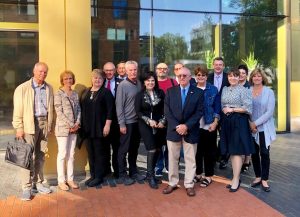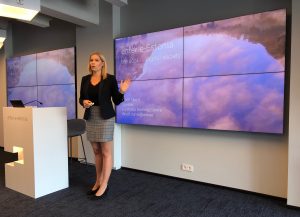Promoting credit union digitization in the “world’s most advanced digital society”

In both established and emerging markets, digitization provides a path to modernizing credit unions and expanding their reach.
At the World Council of Credit Unions (WOCCU), we believe so strongly in the power of digitization—we’ve established Challenge 2025: digitization of the global credit union system.
And no country shows the possibilities digitization offers like the small Eastern European nation of Estonia.

I recently joined a group of professionals from the Virginia Credit Union League (VACUL) and CULedger on a WOCCU Global Classroom exchange to the Estonian capital city of Tallinn, hosted by the Estonian Union of Credit Cooperatives (EUCC).
There are fewer than two dozen credit unions in all of Estonia, representing just .01% of the country’s entire financial sector. But the potential to grow that reach is immense, due to Estonia’s unique position as one of the most advanced digital societies in the world. In fact, Wired magazine has called it the most advanced digital society. VCUL representatives learned why—and took home a vast array of information on how far they can advance their digital services as well.

The digital future
The exchange—dubbed “Tallinn Forum 2019”—included presentations detailing the challenges and opportunities technologies such as cryptocurrencies and blockchain present for credit unions.

John Ainsworth, CEO of CULedger, provided an overview of why it’s important for credit unions to build up their technology today, so they can deliver for members tomorrow.
But to see the results of what full commitment to a digital future looks like, forum participants were treated to a presentation by E-Estonia—an arm of the Estonian government that promotes and facilitates online services for just about everything.
It was fascinating to see the extent to which their e-Governance solutions have digitized life in Estonia. By utilizing a simple government ID card enabled with a special chip, Estonian citizens can select e-solutions for 99% of all public services right on their laptops or phones, at a time and place convenient for them. In most cases, there is never any need to physically visit the agency providing the service. The services include:
- employment
- pension
- taxes
- voting
- driver’s licenses (no need for a separate card, stored in ID)
- healthcare
Estonia’s e-Health program was particularly interesting for exchange participants, showing how digital systems can deliver amazing customer service. Citizens’ healthcare is centralized on this system, allowing individuals to access their full medical records—including all procedures done during a surgery and medicines applied. It also allows them to see if anyone has accessed their record. The system is directly linked to pharmacies online to coordinate prescription dispensing and avoid errors. If a person is authorized for sick leave from the doctor, their employer is even notified directly through the system. It is both brilliant and efficient.
Needless to say, our exchange participants were in awe of what Estonia has accomplished through digitization. While they will take that knowledge and examine the digital future of their own credit unions, World Council will continue working with its partners—such as CULedger—to examine ways we can get credit unions in Estonia and other developing nations to thrive digitally and grow their membership—as we build to meet our Challenge 2025 goal.





